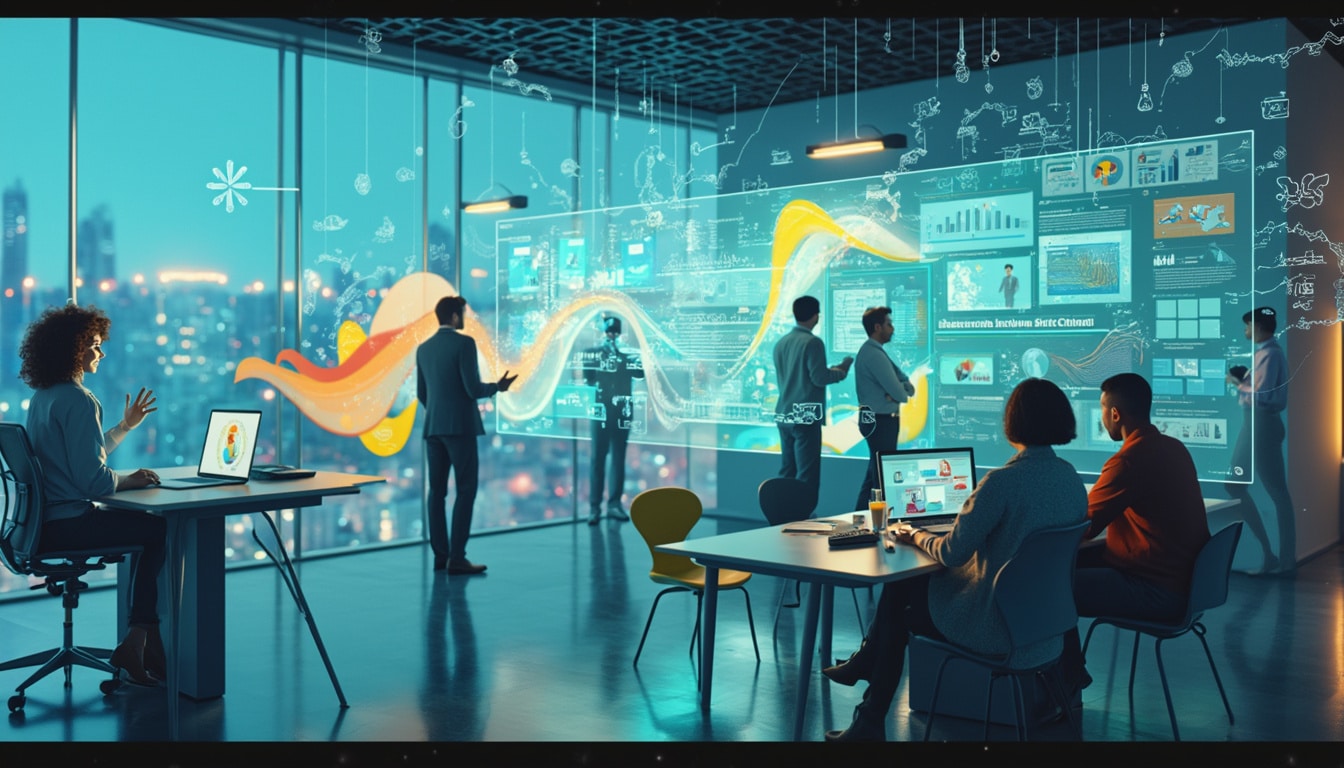Microsoft celebrates its 50th anniversary by unveiling a bold vision for the future. The leaders of the tech firm have bet big on artificial intelligence. This strategy marks a new era of innovation and personalization.
On this special occasion, executives reminded everyone of the key moments in the company’s history while projecting Microsoft into a future dominated by AI. Under the leadership of Satya Nadella, the company aims to be at the forefront of this revolution, democratizing AI just as it popularized the PC. Mustafa Suleyman, executive vice president, detailed upcoming initiatives, including the personalization of Windows to meet the specific needs of each user.
The heart of this transformation lies in Copilot, a personal assistant powered by AI that mimics human sensory capabilities. Suleyman mentioned the initial steps towards a rich memory and enhanced personalization, thus laying the groundwork for a true AI companion. This feature will allow Copilot to remember preferences, important dates, and significant events, thereby providing a deeply personalized user experience.
In parallel, Microsoft is developing avatars to make interactions with Copilot more playful. These avatars include animated characters, with a touch of humor reminiscent of the iconic Clippy from the old Office suite. One of the major innovations presented is Copilot Vision, a mobile application that uses the phone’s camera to offer real-time interaction with the real world. Another application for Windows allows users to capture the PC screen and interact with the displayed content, facilitating search, parameter modification, and collaboration without needing to toggle between different applications.
Moreover, Microsoft has launched Copilot Search, integrating AI into Bing search to provide more relevant and personalized results. This feature generates magazine-style cards with text, images, videos, and embedded maps tailored to each user’s interests. The company also introduced “Podcasts,” an AI feature capable of instantly generating podcasts with video and audio, as well as new technologies for Azure AI Foundry.
For professional users, Microsoft recently deployed research and analysis agents to improve productivity and enterprise search. Jack Gold, principal analyst, emphasized that AI could represent the most significant change for the PC since the graphical interface, providing valuable insights in an increasingly complex information environment. However, he warned that fully leveraging AI would take time due to challenges related to usability, privacy, and security.
In summary, Microsoft positions itself as a leader in AI integration, not only at the operating system level but also through applications that support professional users. The road to full maturity of these technologies is still long, but the foundations laid today promise to profoundly transform how we interact with technology.

Table of Contents
ToggleAt 50, a look back at Microsoft’s history
Microsoft celebrates this year its 50th anniversary, a milestone for a company that has profoundly transformed the global technological landscape. Founded in 1975 by Bill Gates and Paul Allen, Microsoft has undergone a spectacular evolution, transitioning from a young player in the microcomputer field to an essential giant in the software and cloud computing industry. Throughout its history, the company has managed to innovate and adapt to the rapid changes in the tech sector, thus consolidating its dominant position.
Microsoft’s evolution is marked by iconic successes, such as the launch of Windows, which revolutionized the user experience of personal computers. Additionally, strategic acquisitions, detailed in this timeline, have allowed Microsoft to expand its influence across various domains, including video games with Xbox and online services with Azure. This ability to diversify its activities while maintaining a clear vision for its technological future is one of the pillars of its longevity.
How AI is shaping Microsoft’s future
On the occasion of its half-century, Microsoft has clearly indicated that artificial intelligence (AI) is at the heart of its future strategy. During the event marking the 50th anniversary, CEO Satya Nadella stated that the company “is leading this new wave of innovation in AI,” emphasizing the importance of democratizing this technology just as they did with personal computers. This commitment translates into massive investments in research and development of AI-based solutions, aiming to transform the way users interact with technology.
The focus on AI also aligns with a drive for continuous innovation. Microsoft is developing tools like Copilot, an AI-powered personal assistant that promises to personalize the user experience by remembering individual preferences and providing contextual reminders and tips. This personalization is made possible through advanced features such as rich memory, which allows Copilot to remember events, dates, and specific preferences, making the assistant more intuitive and effective over time.
For those interested in the technical aspects and security updates, Microsoft deployed 63 updates during its recent Patch Tuesday, thus enhancing the reliability and security of its cloud services. Furthermore, Microsoft’s efforts to integrate AI into its products are also visible in solutions such as Power Automate, which transforms business productivity by automating complex tasks.
Copilot: the personalized assistant
Copilot represents one of Microsoft’s most promising innovations in the field of AI. Positioned as an assistant with advanced generative capabilities, Copilot aims to become a true digital companion by integrating features such as personalization and memory. Mustafa Suleyman, executive vice president at Microsoft, explained that Copilot is becoming a personal assistant capable of remembering user preferences and providing relevant reminders, which is a significant advancement in human-machine interaction.
One of Copilot’s standout features is Copilot Vision, a mobile application that allows users to interact with the real world in real time. By using their phone’s camera, users can capture images and receive immediate contextual information, thereby enhancing their experience and productivity. Additionally, the Windows version of Copilot Vision can analyze screenshots and help users navigate their digital content more intuitively and effectively.
Microsoft has not overlooked the playful and interactive aspect of Copilot by developing animated avatars, making interaction with the assistant more engaging. This approach aims to humanize the user experience, making Copilot not only a functional tool but also a friendly presence in users’ digital daily lives. To learn more about the impact of Copilot on the performance of Microsoft products, check out this article.
Key innovations showcased during the event
During the 50th anniversary event, several innovations were unveiled, highlighting the direction that Microsoft wishes to take. In addition to Copilot, the company announced Copilot Search, which integrates AI into traditional Bing search to provide more personalized and dynamic results. This new feature allows users to obtain “magazine-style cards” on various topics, enriching the search experience with embedded text, images, videos, and maps.
Another highlight of the event was the presentation of new avatars for Copilot, including a humorous version of Clippy, the iconic Microsoft Office mascot. This initiative aims to make interaction with AI more enjoyable and less formal, thereby encouraging broader adoption of these innovative technologies. Additionally, Microsoft introduced AI-generated podcasts, offering a new way to consume multimedia content in a personalized and efficient manner.
For businesses, Microsoft presented a potential investigation by the British regulator into Microsoft and AWS cloud services, highlighting the regulatory challenges the company faces while pursuing its innovations. Additionally, advanced technologies for Azure AI Foundry were unveiled, promising to enhance the development and deployment capabilities of AI solutions across various industrial sectors.
Challenges and perspectives for the future
Although Microsoft positions itself as a leader in AI innovation, several challenges remain. Integrating AI into enterprise applications raises complex questions of privacy and security. Jack Gold, principal analyst at J. Gold Associates, emphasized that “AI represents the greatest change to the PC since the graphical user interface,” but that its effective adoption will require overcoming obstacles related to usage and protection of sensitive data.
The implementation of advanced features like memory and personalization also raises concerns regarding the management of users’ personal information. Microsoft must navigate this landscape carefully, balancing innovation with respect for privacy. Moreover, the widespread adoption of AI in enterprise environments will require ongoing maturation of technologies and management practices, a process that could extend over the next decade.
Despite these challenges, the outlook is encouraging. The innovations presented during the event demonstrate a clear and ambitious vision for the future of Microsoft, with AI and Copilot at the heart of this transformation. By continuing to invest in research and development, and by closely collaborating with regulators and users, Microsoft is well-positioned to continue shaping the future of technology in a meaningful way.
Adoption and impact on business productivity
The introduction of AI-based solutions by Microsoft, such as Power Automate, has a significant impact on business productivity. By automating repetitive tasks and providing advanced analytics, these tools enable teams to focus on higher-value activities. The integration of AI into business processes also facilitates more informed and responsive decision-making, thereby enhancing organizational efficiency.
Additionally, Microsoft recently reported financial results exceeding expectations, with record growth of its digital products. This performance reflects the growing demand for innovative and reliable solutions, and underscores Microsoft’s ability to effectively address the changing needs of the market. By continuing to explore new technologies and adapt to emerging trends, the company is well-positioned to maintain its growth and innovation trajectory.
Market perspective and competitiveness
In an increasingly competitive technological environment, Microsoft also faces regulatory and competitive challenges. As previously mentioned, the British regulator is considering an investigation into Microsoft’s cloud services, signaling increased scrutiny from authorities towards large tech companies. This attention emphasizes the importance for Microsoft to maintain transparent practices and compliance with existing regulations.
Furthermore, competition with other industry giants, such as AWS, requires continuous innovation and clear product and service differentiation. Microsoft is betting on AI and personalized solutions like Copilot to stand out and offer unique added value to its customers. The ability to anticipate and meet market needs while navigating a complex regulatory framework will be crucial for Microsoft’s future competitiveness.
In conclusion, Microsoft’s 50th anniversary marks an important milestone where the company reaffirms its commitment to innovation and the adoption of AI as the main driver of its future. By overcoming challenges and capitalizing on opportunities presented by new technologies, Microsoft is well-positioned to continue influencing and leading the global technology sector in the years to come.










